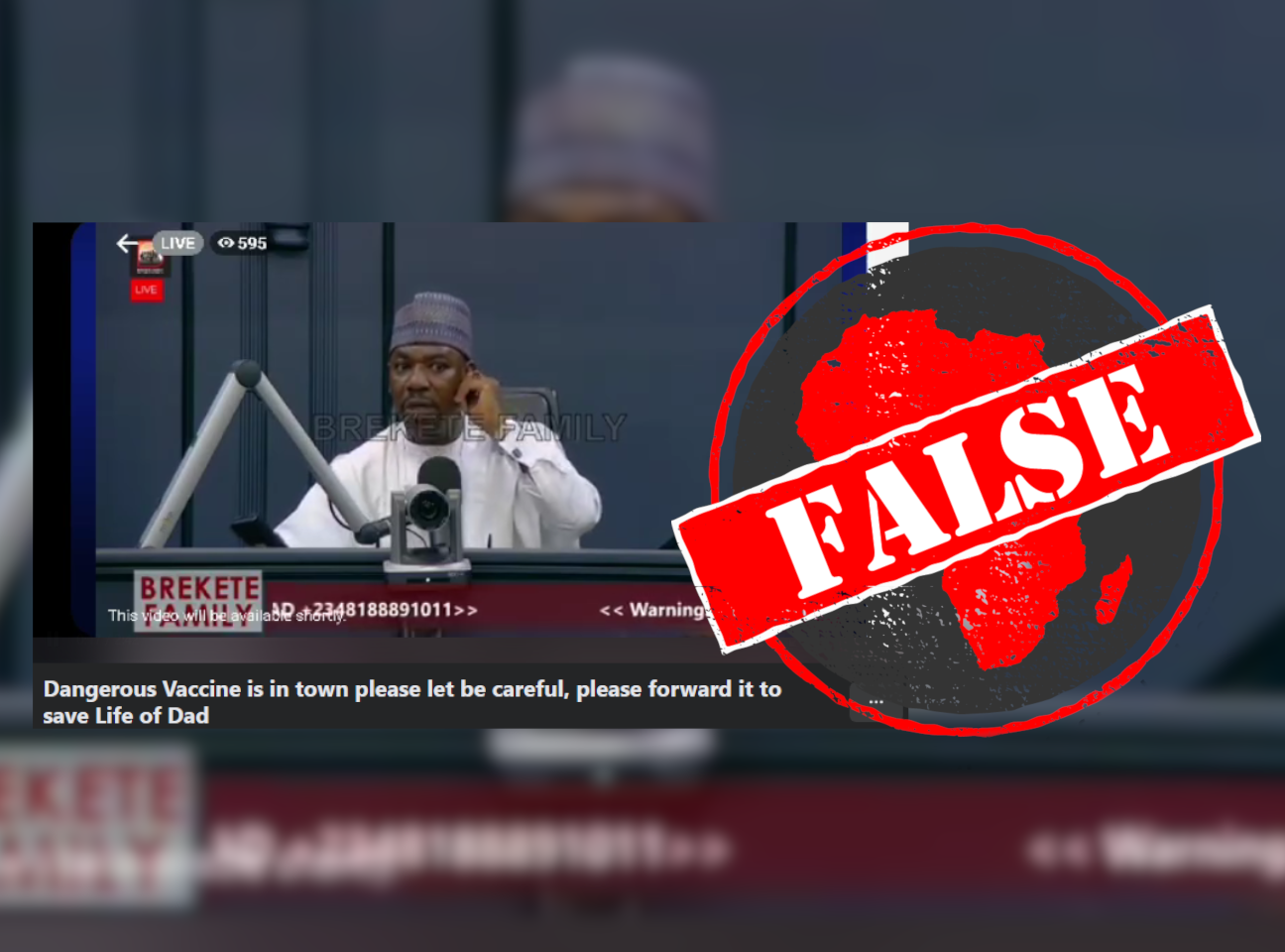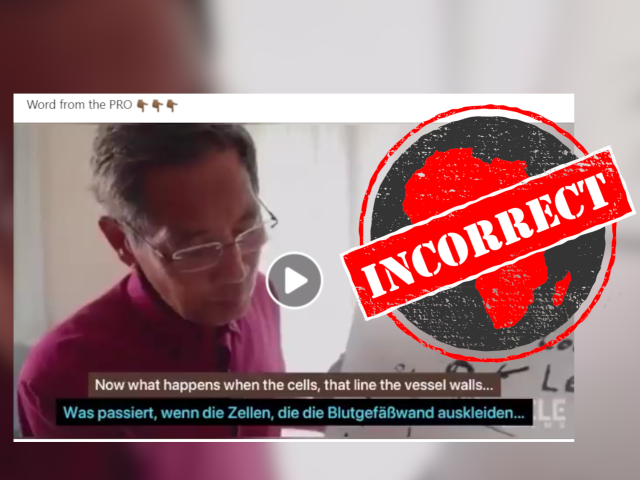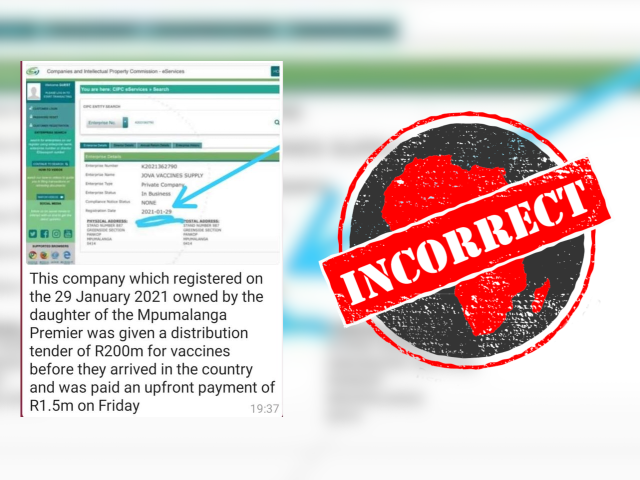IN SHORT: As Nigeria began to vaccinate 7. 7 million girls against the virus that can cause cervical cancer, radio host Ahmad Isah warned his audience against the jab. He was wrong, and got experts to explain the facts the next day. But a clip of his earlier comments is now going viral.
A popular Nigerian radio host gives dangerously incorrect advice on human papillomavirus (HPV) vaccines in a video doing the rounds on social media. The vaccines protect women against cervical cancer.
The host is Ahmed Isah, also known as the Ordinary President. The clip is taken from the 25 October 2023 broadcast of his live Brekete Family show.
In it, he says in Nigerian pidgin: “They wan give cervical cancer vaccine to una daughters. Make una no agree. America never get cure for cancer, China never get, UK never get. Make una no forget wetin happen for Kano. Pfizer kill many children.”
This roughly translates as: “They want to give the cervical cancer vaccine to our daughters. We must oppose this. America never got the vaccine, nor did China or the UK. We must not forget what happened in Kano. Pfizer killed many children.”
Kano is the capital of Kano state in northern Nigeria.
In 1996, US pharmaceutical company Pfizer tested a new antibiotic on 200 children in the city. Eleven died and many more suffered paralysis, deafness, blindness and other symptoms. The drug was not approved for use in the US.
The day before Isah’s broadcast, Nigeria launched a five-day mass vaccination campaign against HPV in 16 of the country’s 36 states. About 7. 7 million girls aged nine to 14 are to get the jab, according to the United Nations (UN).
Isah’s clip can also be seen here, here and here.
The harm caused by vaccine hesitancy in Nigeria was one of the reasons Africa Check was founded. And Isah is wrong to say HPV vaccines should be opposed, and aren’t used in the US, UK and China.

What is HPV?
Human papillomaviruses are a family of more than 100 viruses usually passed from one person to another during sex. HPV is believed to be the most common cause of sexually transmitted infection, or STI, in the world.
Most people get HPV at some point in their lives, but in 90% of cases the body fights it off.
Some types of HPV can cause genital warts. Others can cause cancer in the vulva, vagina, mouth, throat, penis, anus and, most seriously, the cervix – the lower part of the womb connected to the vagina.
Each year an estimated 625,600 women and 69,400 men across the world are diagnosed with an HPV-related cancer, the World Health Organization (WHO) says.
In 2020 Nigeria recorded some 12,000 new cases of cervical cancer and 8,000 deaths, according to the UN. It’s the country’s second most common cause of cancer deaths among women aged 15 to 44.
HPV vaccines safe for girls, approved in US, UK and China
The WHO licensed the first vaccine against HPV in 2006. There are now six types of vaccine approved for use.
They are all extremely safe.
Since 2006 more than 500 million HPV jabs have been given across the world with no serious safety concerns. There are rare reports of anaphylaxis, a severe allergic reaction to the vaccine, but the risk of this is very low, estimated at about 1.7 cases in every million doses.
Experts on the WHO’s Global Advisory Committee on Vaccine Safety regularly review data on HPV vaccines and have repeatedly declared them to be safe.
HPV vaccines are most effective when given to girls before they become sexually active, so there’s less chance of them already being infected. The WHO recommends that vaccination start at the age of nine.
HPV vaccines have been approved for use in the US since 2006 and in the UK since 2008. The uptake in China has been slower, but the country now has five types of HPV vaccine available, all approved by its food and drug administration.
The vaccines are available in about 125 countries as of 2023.
More than this, the drug tested on children in Kano in 1996 was an experimental antibiotic, not a vaccine. Antibiotics fight infections by bacteria already in the body. Vaccines help prevent infections by bacteria and viruses from taking hold.
In his next Brekete Family broadcast, on 26 October 2023, Isah hosted Dr Chizoba Wonodi, the Nigeria country director of the Johns Hopkins International Vaccine Access Center.
She and other experts explained at length that HPV vaccines are completely safe and widely available across the world.
Republish our content for free
For publishers: what to do if your post is rated false
A fact-checker has rated your Facebook or Instagram post as “false”, “altered”, “partly false” or “missing context”. This could have serious consequences. What do you do?
Click on our guide for the steps you should follow.
Publishers guideAfrica Check teams up with Facebook
Africa Check is a partner in Meta's third-party fact-checking programme to help stop the spread of false information on social media.
The content we rate as “false” will be downgraded on Facebook and Instagram. This means fewer people will see it.
You can also help identify false information on Facebook. This guide explains how.




Add new comment